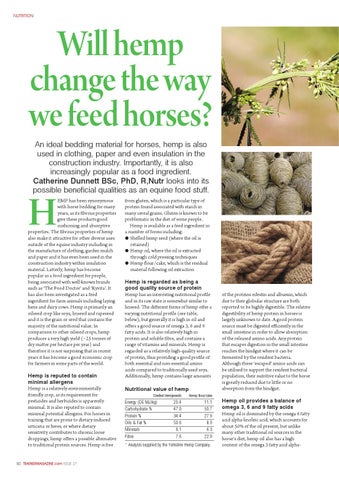HEMP ISSUE 27 v2.qxd:Jerkins feature.qxd
21/8/09
11:41
Page 1
NUTRITION
Will hemp change the way we feed horses? An ideal bedding material for horses, hemp is also used in clothing, paper and even insulation in the construction industry. Importantly, it is also increasingly popular as a food ingredient. Catherine Dunnett BSc, PhD, R,Nutr looks into its possible beneficial qualities as an equine food stuff.
H
EMP has been synonymous with horse bedding for many years, as its fibrous properties give these products good cushioning and absorptive properties. The fibrous properties of hemp also make it attractive for other diverse uses outside of the equine industry including in the manufacture of clothing, garden mulch and paper and it has even been used in the construction industry within insulation material. Latterly, hemp has become popular as a food ingredient for people, being associated with well-known brands such as ‘The Food Doctor’ and ‘Ryvita’. It has also been investigated as a feed ingredient for farm animals including laying hens and dairy cows. Hemp is primarily an oilseed crop like soya, linseed and rapeseed and it is the grain or seed that contains the majority of the nutritional value. In comparison to other oilseed crops, hemp produces a very high yield (~25 tonnes of dry matter per hectare per year) and therefore it is not surprising that in recent years it has become a good economic crop for farmers in some parts of the world. Hemp is reputed to contain minimal allergens Hemp is a relatively environmentally friendly crop, as its requirement for pesticides and herbicides is apparently minimal. It is also reputed to contain minimal potential allergens. For horses in training that are prone to dietary-induced urticaria or hives, or where dietary sensitivity contributes to chronic loose droppings, hemp offers a possible alternative to traditional protein sources. Hemp is free
50 TRAINERMAGAZINE.com ISSUE 27
from gluten, which is a particular type of protein found associated with starch in many cereal grains. Gluten is known to be problematic in the diet of some people. Hemp is available as a feed ingredient in a number of forms including: G Shelled hemp seed (where the oil is retained) G Hemp oil, where the oil is extracted through cold pressing techniques G Hemp flour/cake, which is the residual material following oil extraction Hemp is regarded as being a good quality source of protein Hemp has an interesting nutritional profile and in its raw state is somewhat similar to linseed. The different forms of hemp offer a varying nutritional profile (see table, below), but generally it is high in oil and offers a good source of omega 3, 6 and 9 fatty acids. It is also relatively high in protein and soluble fibre, and contains a range of vitamins and minerals. Hemp is regarded as a relatively high-quality source of protein, thus providing a good profile of both essential and non-essential amino acids compared to traditionally used soya. Additionally, hemp contains large amounts Nutritional value of hemp Shelled Hempseeds
Energy (DE MJ/kg) Carbohydrate % Protein % Oils & Fat % Minerals Fibre
25.4 47.0 34.4 50.6 6.1 7.6
Hemp flour/cake
11.1 50.7 27.9 8.9 6.3 22.0
* Analysis supplied by the Yorkshire Hemp Company
of the proteins edestin and albumin, which due to their globular structure are both reported to be highly digestible. The relative digestibility of hemp protein in horses is largely unknown to date. A good protein source must be digested efficiently in the small intestine in order to allow absorption of the released amino acids. Any protein that escapes digestion in the small intestine reaches the hindgut where it can be fermented by the resident bacteria. Although these ‘escaped’ amino acids can be utilised to support the resident bacterial population, their nutritive value to the horse is greatly reduced due to little or no absorption from the hindgut. Hemp oil provides a balance of omega 3, 6 and 9 fatty acids Hemp oil is dominated by the omega 6 fatty acid alpha-linoleic acid, which accounts for about 50% of the oil present, but unlike many other traditional oil sources in the horse’s diet, hemp oil also has a high content of the omega 3 fatty acid alpha-
